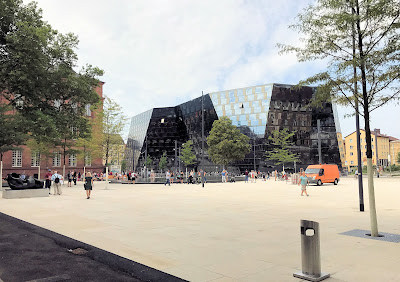On August 10, the German Postal Service issued a stamp commemorating the 400th anniversary of the Fruchtbringende Gesellschaft, an association promoting the German language. The founding of the Fruitbearing Society took place in the run-up to the Thirty Years' War on August 24, 1617.
 |
Another stamp of 2017: The Wartburg
where in 1521, Luther translated the New Testament into German |
Following Luther's translation of the New Testament into everyday language in 1521 one hundred years later the society for cultivating the German language was another important step
jm Gantzen Reich, ein einträchtige Sprach, ein einträchtige Regierung, vnd Endlich Auch ein einträchtige Religion, bequemlich ein zuführen, und friedlich zuerhalten sey (to introduce conveniently a common language, a common government and finally a common religion in all the German Reich and to keep it peaceful).
The English Wikipedia translates
Fruchtbringende Gesellschaft into
Fruitbearing Society, and indeed the Society engendered many new German words for Latin or Greek expressions common at that time. Many of the new words stuck and are still employed today. Most of those creations make use of the possibility in German to bind two single words together to form a new one, e.g.,
Anschrift (writing to) for address
Augenblick (a blink of the eyes) for a moment
Briefwechsel (exchange of letters) for correspondence
Bücherei (books stall) for library
Kreislauf (running in a circle) for circulation
Mundart (kind of mouth) for dialect
Rechtschreibung (correct writing) for orthography
Rückblick (looking back) for retrospect
Sinngedicht (poem with a meaning) for epigram
Sprachlehre (teaching of a language) for grammar
Tagebuch (book of days) for diary
Vollmacht (full power) for procuration
Wörterbuch (word book) for dictionary
Zeitwort (the word expressing the tense) for the verb
In particular,
Philipp von Zeesen was very active creating
German neologisms, although his newly created word
Gesichtserker (face oriel) for nose did not become popular, possibly for being longer than
Nase (nose). Nowadays,
Gesichtserker is sometimes used in funny situations.
This "forced" Germanization was in contrast to the many foreign influences on the German language in particular during the Thirty Years' War. The society strived
daß man die Hochdeutsche Sprache in jhren rechten wesen und standt ohne einmischung frembder außländischer wort auffs möglichste und thunlichste erhalte unn sich so wohl der beste außsprache im reden alß der reinesten art im schreiben unn Reimen-dichten befleißige (that one must keep the High German language in its right nature and standing when feasible and possible without interference from alien foreign words and one must cultivate the best pronunciation when talking and the purest way when writing and rhyming).
The list of members of the Fruitbearing Society during the Thirty Years' War surprises with an impressive collection of foreign military men: General
Franz von Mercy from Lorraine, Italian-born Army Commander
Octavio Piccolomini, and Swedish Chancellor
Axel Oxenstierna. It is almost a miracle that despite this military presence, the Society survived the chaos of the war, or is it instead because of?
In 1636 the poet and member of the
Fruchtbringende Gesellschaft Andreas Gryphius wrote his devastating Sonett
Threnen des Vatterlandes describing the atrocities of the ongoing war. Here is an English translation:
Full now—yea, more than full--behold our devastation:
The frantic drum beat and the brazen horde,
The thundering siege gun and the blood-slick sword
Devour all diligence, and sweat, and careful preparation.
The church is overthrown; our mighty men are slain;
The town hall lies in dust; our towers burn;
Virgins are raped, and everywhere we turn
Are fire, plague, and death to pierce us—heart and brain.
Down walls and through the town always runs fresh-spilled blood.
For eighteen summers now, our river's yearly flood
Near-choked with corpses, has pushed slowly, slowly on
But nothing will I say of one thing—worse, I know
Than death, grimmer than plague, or fire, or hunger's woe:
Those pillaged souls from whom even hope of heaven is gone.
Near the end of the war in 1642 the Alsatian Baroque poet
Johann Michael Moscherosch, member of the Fruitbearing Society, was appalled about Germans preferring foreign languages to their mother tongue and wrote a satirical poem
Der deutsche Michel: Wider alle Sprachverderber, Cortisanen, Concipisten vnd Concellisten, welche die alte teutsche Muttersprach mit allerley frembden, Lateinischen, Welschen, Spannischen vnd Frantzösischen Wörtern so vielfältig vermischen, verkehren vnd zerstehren, daß Sie ihr selber nicht mehr gleich sihet, vnd kaum halber kan erkant werden (
The Honest Fritz: Against all spoilers of the language, courtesans, concipients, and concellists who mix, distort, and destroy the old German mother tongue with all kinds of alien, Latin, South European, Spanish, and French words so that it does no longer resemble itself and even is hardly recognized).
Günter Grass refers to Moscherosch's dismay in his novella
Das Treffen in Telgte (
The Meeting at Telgte):
Das entsprach dem allgemeinen Ärger über die Verhunzung der deutschen Sprache, deren gefühligem Grund die welschen und schwedischen Feldzüge ihre Huf- und Radspuren gekerbt hatten (This complied with the general anger about the mucking-up of the German language. Hoof prints and wheel tracks of French and Swedish military campaigns had carved the tongue's sensitive ground).
*

















































